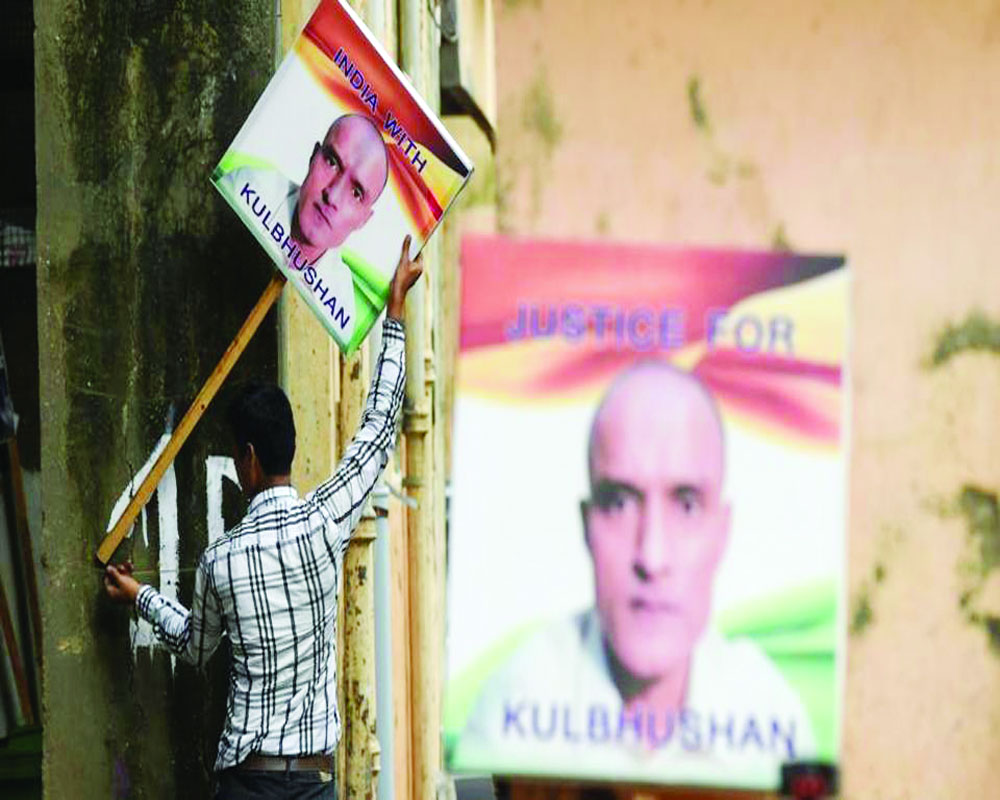The ICJ ruling favours India but much depends on what Pakistan intends to do, hit back or negotiate a release
Now that the euphoria over the International Court of Justice (ICJ) ruling on Kulbhushan Jadhav, the man condemned by Pakistan to death for being a spy, granting him a breather has died down, it is time to smell the coffee. Diplomatically, there is a lot of work ahead and unfortunately, much of it will depend on the Indo-Pakistan bilateral dynamic. The ICJ has merely defended India’s cogent arguments on points of law, basically on Pakistan violating the Vienna convention by denying consular access to Jadhav after a closed trial and not facilitating a legal counsel. As a corollary, it stayed Jadhav’s execution on the ground that since due processes were not followed, that would be null and void, including Jadhav’s forced confession on which the whole case was pivoted. It, therefore, urged for a fresh review and reconsideration of processes to arrive at a sentence and did not annul the old one. Which means that if all rules were complied with and the sentencing was still to be the same, it would not change the endgame. Nor has it issued any directive on shifting proceedings from a military to a civil court in Pakistan. In short, the ICJ has kept to human rights and stayed avidly clear of commenting on the validity of the internal legal processes of a free country. The court took special note of Pakistan’s three-week delay in informing India about Jadhav’s arrest, emphasising the fairness of established global practice. Truth be told, the ICJ has not overstepped its brief or got swayed by all of India’s pleas for releasing Jadhav and worked out the best case scenario, staying within its ambit and upholding international protocols set by a common consent of nations. So India can now only appeal if the criteria set by this ruling are not met. Neither is there any timeline on how long the stay would last, the court asking Pakistan to resort to “means of its own choosing.”
Having said that, the verdict does put a lot of pressure on Pakistan. The ruling was 15 to one in favour of India; the lone dissenter being the judge from Pakistan. Even the judge from China supported India’s claim, which has further put Islamabad in a spot. For all its strategic interests, China has now carefully sifted its dealings with Pakistan on a nation to nation basis and delinked them from larger international concerns where it does not want to be seen in a poor light for defending the indefensible. Pakistan would now not only have to follow due processes but begin afresh, overturning the narrative that its Army has crafted for so long and one which the ICJ has all but rejected. Besides, at the moment Pakistan is under a global scanner and has to be seen as doing the right thing. For example, it “arrested” terror fountainhead Hafiz Saeed so as not to be blacklisted by the Financial Action Task Force (FATF), which can disqualify a nation from World Bank and IMF grants over continued terror funding. But then US President Donald Trump ran down Pakistan’s “good intention” by openly admitting to pressuring it to crack down on Saeed. With the Damocles’ sword hanging over its head, courtesy India getting a lion’s share of the global opinion, it is unlikely that Pakistan would give up its intransigence on Jadhav so easily. But once India gets consular access, it can get a first-hand view from Jadhav himself on the circumstances of his arrest, his detention and grilling operations, abuses if any. In that case, it can build a larger case of rights infringement and torture to further dent Pakistan’s image. By providing legal assistance as mandated, India can even track proceedings in the Jadhav case. In view of these, a cornered Pakistan, particularly the military, may just be reactive and cleverly find ways and means to frame Jadhav all over again. Given its past stance and India’s new position post-Balakot on “zero tolerance” to cross-border terrorism, Pakistan might just use the same argument to hold Jadhav. Particularly, the military establishment is in a cleft stick. At one end, its endorsement of terrorist networks to build strategic relevance is starting to thin out in the West, which once acknowledged its necessity but is now clearly also a victim of it. At the other end is India, which has the diplomatic edge. Given its ascension as a key player after China in a multi-polar world, it is blunting the old argument of threatening Pakistan’s security. Jadhav may still be a victim of Pakistan’s obsessive blowback and have a long haul ahead.


























